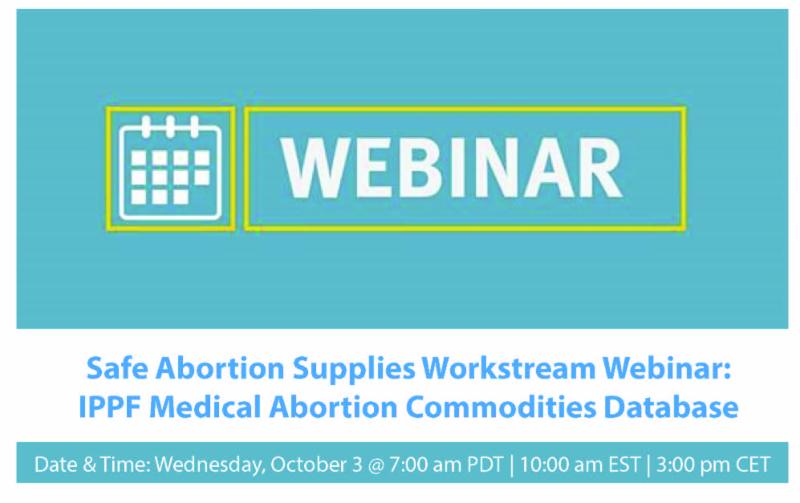 |
|
Greetings from New York,
S
ince the approval of Mifeprex® in the United States in 2000, dozens of studies and extensive experience have confirmed the efficacy and safety of mifepristone followed by misoprostol for medical abortion. However, many women who could benefit from mifepristone still do not have access to it. To show our support for today's International Safe Abortion Day, an annual day of action, our
"Spotlight on..."
shines a light on the work of the Coalition to Expand Access to Mifepristone in the U.S. (also known as the "Mife Coalition"), an alliance of 360 individuals representing 150 organizations that stand behind expanded access to safe medical abortion. The Coalition calls for the removal of politically motivated and/or medically unnecessary restrictions on mifepristone. These restrictions do not make medical abortion safer; instead they place a burden on women by creating barriers to access and increasing cost. Removing unnecessary barriers can improve health, reduce stigma, and save lives.
Gynuity joins our colleagues around the globe in recognizing International Safe Abortion Day.
|
 |
 Beverly Winikoff
Beverly Winikoff
President
|
|
GYNUITY HEALTH PROJECTS HAS MOVED
|
We have moved. Our new location is 220 East 42nd Street, Suite #710, New York, NY 10017, U.S.A.
|
|
A roadmap for research on self-managed abortion in the United States
|
Advancing New Standards in Reproductive Health (ANSIRH), Gynuity, and Ibis Reproductive Health released in August a forward-looking research agenda focused on self-managed and de-medicalized abortion in the United States. The research roadmap -- available to download
here
- focuses on supporting safe access to self-managed medical abortion, and details the plans of these three organizations to undertake needed research and work together to fill the identified gaps.
|
A grant from the Reproductive Health Supplies Coalition's (RHSC) Innovation Fund on oral anti-hypertensives for women with pregnancy hypertension
Failure to provide effective treatment for severe hypertension in pregnancy is one of the most common causes of sub-standard care of women with preeclampsia. While great efforts have been made to expand access to, and use of, magnesium sulfate for treatment of preeclampsia, the use of antihypertensive agents has received less attention, although they also reduce the risk of serious maternal complications. See below Easterling et al. Oral antihypertensive drugs are easy to administer, potentially more available, less expensive, and may be offered in settings where administration of IV drugs may not be feasible. Gynuity was awarded a grant from the
RHSC's Innovation Fund
to support a landscape analysis assessing the readiness of health facilities to diagnose, monitor and treat women with pre-eclampsia and other hypertensive disorders of pregnancy in three countries: Uganda, Mexico and India. The findings from this work
-- which is being done under the auspices of the Maternal Health Supplies Caucus of the RHSC -- will be available in 2019.
|
|
Medical abortion commodities database launched
|

The International Planned Parenthood Federation (IPPF) worked closely with Gynuity and the Concept Foundation to develop a Medical Abortion Commodities Database. The
online resource is open to anyone seeking comprehensive country-level information on quality medical abortion commodities - misoprostol, mifepristone and co-packaged mifepristone and misoprostol (combi packs). On Wednesday October 3rd, the Safe Abortion Supplies Workstream housed within the New and Underutilized Reproductive Health Technologies Caucus at RHSC will host a webinar to present the new database. You can register
here to participate.
|
|
Gynuity and partners complete multi-country study assessing introduction of condom uterine balloon tamponade (UBT) for management of uncontrolled postpartum hemorrhage (PPH)
 In July, principal investigators met to review and analyze data from a large study assessing the introduction of UBT for uncontrolled PPH in low and lower-middle income settings. Implemented in Uganda, Senegal and Egypt, the stepped-wedge, cluster-randomized trial examined whether integrating UBT into PPH care reduced the combined incidence of PPH-related deaths and need for invasive surgical procedures for treatment of refractory PPH after vaginal delivery. The results will be shared on Tuesday October 16th during a Gynuity- and FIGO-sponsored session at the FIGO World Congress in Brazil (further details below). In July, principal investigators met to review and analyze data from a large study assessing the introduction of UBT for uncontrolled PPH in low and lower-middle income settings. Implemented in Uganda, Senegal and Egypt, the stepped-wedge, cluster-randomized trial examined whether integrating UBT into PPH care reduced the combined incidence of PPH-related deaths and need for invasive surgical procedures for treatment of refractory PPH after vaginal delivery. The results will be shared on Tuesday October 16th during a Gynuity- and FIGO-sponsored session at the FIGO World Congress in Brazil (further details below). |
|
Telemedicine in the press: Filling the gaps in America's abortion care
|
A recent article in Wired examines how telemedicine could help fill the gaps in abortion care in the U.S. and features recent and ongoing research by Gynuity, including the TelAbortion study -- America's first direct-to-patient telemedicine model which allows women to access medical abortion without going to an abortion clinic. After communicating electronically with an abortion provider and obtaining screening tests locally, qualifying women in Hawaii, Oregon, Washington, New York, and Maine receive the abortion drugs by mail. Work is underway to expand the project to serve women in other states.
|
|
NEW MATERIALS: TASK-SHARING IN MEXICO
|
20th
annual mifepristone medical abortion meeting
Clinicians, researchers, donors, reproductive health advocates, and pharmaceutical representatives gathered in June for the 20th annual mifepristone medical abortion meeting, "Mifepristone Medical Abortion: Responding to a World in Flux." Over 130 participants from the U.S. and beyond shared updates about new science and programs designed to expand access to mifepristone and explored different approaches to facilitate autonomy in medical abortion. The meeting included in-depth conversations on the controversial "abortion pill reversal" method, provision of medical abortion to displaced persons, streamlining second trimester abortion, and expansion of the telemedicine model of abortion care in countries outside of the U.S.
|
In
October, Rio de Janeiro
will provide the setting for the XXII FIGO World Congress of Gynecology and Obstetrics, an important triennial event attracting leading experts in women's health from around the world. Gynuity has put together an exciting program featuring highlights from our global research and collaborative projects on a range of reproductive and maternal health topics, including abortion and postabortion care, postpartum hemorrhage and pre-eclampsia/eclampsia. If you are travelling to Brazil for the Congress, our team looks forward to seeing you. Our at-a-glance program is available to view here.
|
NEW PEER-REVIEWED ARTICLES
|
Easterling, T., Hebert, M., Bracken, H., Darwish, E., Ramadan, M.C., Shaarawy, S., et al.
A randomized trial comparing the pharmacology of magnesium sulfate when used to treat severe preeclampsia with serial intravenous boluses versus a continuous intravenous infusion
. BMC Pregnancy Childbirth. 2018 Jul 6;18(1):290.
Anger, H., Dabash, R., Peña, M., Coutiño, D., Bousiéguez, M., Sanhueza, P., Winikoff, B.
Use of an at-home multilevel pregnancy test and an automated call-in system to follow-up the outcome of medical abortion
. International Journal of Gynecology & Obstetrics. 2018 Sep 16. doi: 10.1002/ijgo.12679. [Epub ahead of print]
|
SPOTLIGHT ON...
|

Coalition to Expand Access to Mifepristone in the United States
In June 2015, Gynuity established the Coalition to Expand Access to Mifepristone in the United States (the Mife Coalition), facilitating coordination among research, policy, legislative, and public actions to increase access to mifepristone medical abortion. The guiding principles underpinning the work of the Mife Coalition are:
- Improving access so that all eligible women in the U.S. who want medical abortion have access to the gold standard for this safe, effective and legal medical service (mifepristone followed by misoprostol);
- Normalizing regulations around mifepristone so that it is treated like any other safe and highly effective medication;
- Working within legal and regulatory systems to effect change to maximize access for everyone; and
- Fostering inclusivity so that our efforts reach all women living in the U.S., especially those who face barriers in accessing medical abortion due to race, ethnicity, socioeconomic status, immigration status, or geography.
The Mife Coalition's key achievements to date include completing an impactful advocacy campaign to promote a label change for mifepristone in the U.S.; heightening knowledge of the U.S. FDA's REMS (Food and Drug Administration's Risk Evaluation Mitigation Strategy) on mifepristone, identifying barriers to access that the REMS system creates, and developing actions to eliminate unnecessary requirements. In addition, the coalition has raised awareness of the unproven nature of claims that high doses of progesterone can "reverse"
mifepristone abortions.
|
On the eve of a vote in August by Argentina's Senate, Gynuity staff joined others in a 'panuelazo' under the Washington Square Arch in New York to show support for a bill allowing elective abortion within the first 14 weeks of pregnancy. After many hours of debate, senators rejected the bill (38 voted against it and 31 in favor). Abortion continues to remain mostly illegal in this Latin American country.
|
Stay Connected


|
|